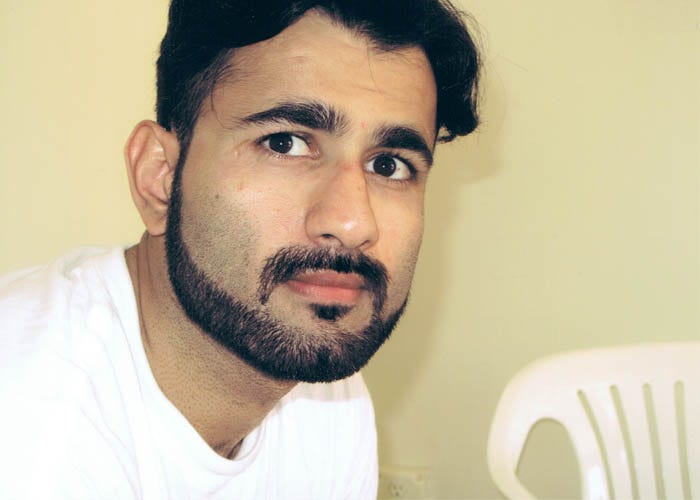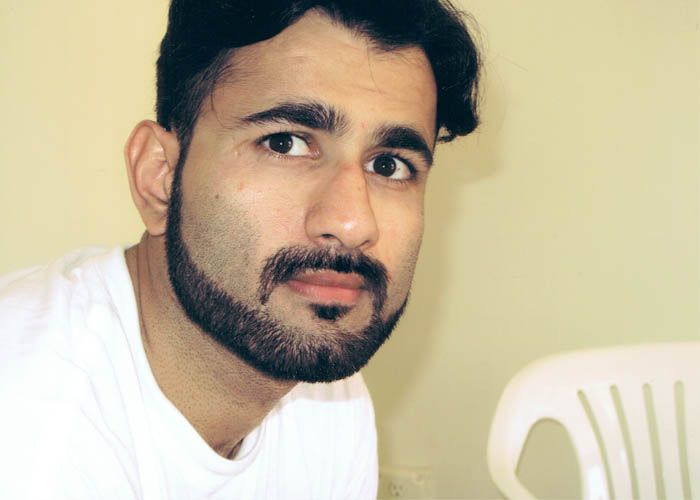Pentagon Official Rules That A Man The CIA Raped And Tortured Can Go Free
Majid Khan's sentence has been reduced to time served. His lawyer doesn't expect bureaucratic subterfuge before Khan flies out of Guantanamo Bay.



Edited by Sam Thielman
AFTER 19 YEARS of horror and captivity at the hands of the CIA and the U.S. military, the senior Pentagon official responsible for the Guantanamo Bay war court ruled on Friday that Majid Khan can leave Guantanamo Bay a free man.
The CIA has watched people it tortured go free before, including Khalid el-Masri, whom the agency brutalized after mistaking him for someone else. But never before has someone who endured both the CIA black sites—for three years—and Guantanamo itself—for 15 more—gone free. In addition to freedom from incarceration, Khan will gain the freedom, should he exercise it, to tell the world what he endured.
In October, the 41-year old Khan became the first black-site survivor to testify about his experience to the war court, a move permitted by the terms of his cooperation deal with the U.S. government for testimony against other detainees. Khan admitted in 2012 to being a courier for al-Qaeda. In his two-hour October statement, he renounced his actions as the awful mistake of his lost youth.
That statement came after Khan described the CIA raping him, sexually molesting him, submerging his head repeatedly in frigid water, and shackling him in total darkness for 60 days, among other tortures.
Khan has lived inside one cage or another since March 3, 2003. The convening authority for the military commissions, Col. Jeffrey D. Wood of the Arkansas National Guard, ruled on Friday that Khan's sentence technically ended on March 1, 2022.
But that's not the same thing as Khan going free—yet. And that creates important tests for the Biden administration and its stated goal, which has yet to become anything like a priority, of closing Guantanamo.
MY FIRST INSTINCT is to wonder whether the military or the CIA will take measures to delay his release bureaucratically. The CIA has quite a history of using extreme, even constitutionally destructive measures to suppress the truth about its post-9/11 torture. Until Khan actually steps on a plane, there will be opportunities to prevent him from boarding one—likely starting with the diplomatic process of finding a country that will take him in. That process is about to get underway.
Khan can't get on a plane today and leave Guantanamo—and until that happens, he is still, functionally, a prisoner, time served or not. (It's unclear what his conditions of confinement will be, however.) But the government will have fewer opportunities for bureaucratic subterfuge here than in other Guantanamo cases.
Wells Dixon, Khan's longtime lawyer at the Center for Constitutional Rights, thinks that not only would efforts to keep his client imprisoned fail, but the interests at stake for the government are such that neither the CIA nor its allies will bother.
"I am confident there is not going to be an effort to obstruct or delay his transfer. That might sound naive, but I am confident," Dixon tells FOREVER WARS.
SIGNIFICANTLY, KHAN will not have to go before the Periodic Review Board. Nor will he need the secretary of defense to certify that he poses no threat to the United States. That takes care of two opportunities for shenanigans. But the administration will still have to locate and negotiate a place for Khan to go—and there is no telling how long the process will take. That retains some opportunity for shenanigans.
Dixon left no doubt that Team Khan considers getting Khan into the U.S. is a nonstarter, although his relatives are U.S. citizens living in Baltimore, where he lived as a teenager. Returning him to Pakistan, his country of citizenship, isn't viable due to the chance he'll be persecuted. So Khan has to await the State Department finding a third country willing to take him in.
"It will not be up to that agency [the CIA] to decide where Majid is transferred," Dixon said, "it will be an interagency decision."
The multiple security agencies making that decision will have several factors weighing down on them. If these agencies undermine Wood’s authority by obstructing the process of finding Khan a new home, they will once again damage the credibility of a military commissions system that the Security State is invested in portraying as functional.
In the past, the CIA has been more than happy to undermine that authority, so clearly that can't suffice as a deterrent. But Khan's case is unique. He is now set up to be the first Guantanamo prisoner to have his sentence ended after turning state's evidence. With 37 other detainees remaining, and their attorneys inevitably watching the outcome of Khan's cooperation agreement, the Biden administration's actions to either resettle Khan quickly or delay his release will determine whether further guilty pleas and testimony deals represent a viable path to closing Guantanamo—or whether the whole thing amounts to the latest cynical ploy in the history of post-9/11 U.S. wartime detention. If it does, then Khan will be the last detainee to seek a deal, and Guantanamo stays open, potentially, longer.
None of this means the CIA or its allies won't try. But they'll have fewer institutional mechanisms at their disposal. They'll also have to oppose the Justice Department's interest in preserving its own ability to get cooperating witnesses—as well as the Biden administration's interest in portraying the U.S. as a country where the rule of law holds. (You do not have to tell me that we stopped being a nation of laws long ago, but the administration's interest in the portrayal is still real.)
"Should all of that fail," Dixon said, Khan is prepared to file a habeas corpus petition, and "it will be up to a federal judge to decide. But I am confident that it won't come to that. I'm confident the administration is going to do the right thing, the way the convening authority did, and transfer Majid to a third country."
VIA JEFF STEIN'S SpyTalk newsletter, a former NSA contractor gives us a glimpse at what intelligence professionals post on their internal social-networking platforms:
Hate speech was running rampant on our applications. I’m not being hyperbolic. Racist, homophobic, transphobic, Islamaphobic, and misogynistic speech was being posted in many of our applications.
On top of that, there were many employees at CIA, DIA, NSA, and other IC agencies that openly stated that the January 6th terrorist attack on our Capitol was justified.
Oh my god! How could that ever have happened! The intelligence agencies have definitely never done this before! Definitely this has never happened on security-state intranets before! How could people in institutions engaged in a War on Terror think this way????

